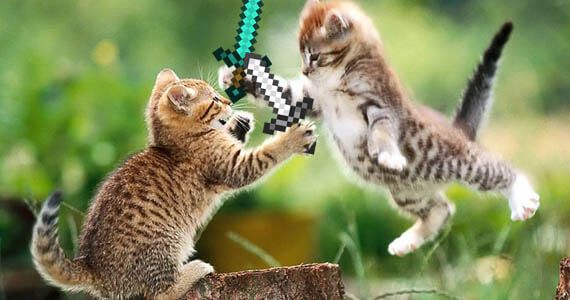In what is one of the more bizarre legal disputes to occur in the video game industry, Bethesda Softworks' parent company, ZeniMax Media, Inc. filed suit against Mojang in a Swedish court on September 27, 2011, to protect its registered trademark on the phrase, “The Elder Scrolls.” The suit stems from Mojang’s attempt to create and register its own trademark for its new game entitled Scrolls. With the substance of Mojang's game being totally dissimilar to that of The Elder Scrolls games, many outside observers of the dispute (including us) quickly jumped to the defense of Mojang as it initially appeared to be a case of bullying by ZeniMax. However, as with most lawsuits, things are not always what they seem at first blush.
The legal brouhaha began when Mojang attempted to register the trademark "Scrolls" for its upcoming card game with the United States Patent and Trademark Office (USPTO). This federal agency prevents other companies from registering trademarks that are already in use, and since Bethesda had trademarked the phrase "Elder Scrolls" for its RPG series, the application was ultimately rejected by the USPTO for the following reasons:
"The examining attorney refuses registration under Trademark Act Section 2(d), 15 U.S.C. §1052(d), because the applicant's mark ... so resembles the marks in U.S. Registration Nos. 2634683, 2861127, 3375520, 3421731 and 3584564 (THE ELDER SCROLLS) and 4010219 (SCROLLS) as to be likely to cause confusion, to cause mistake, or to deceive. ... Regarding the THE ELDER SCROLLS marks, the applicant has merely deleted the term ELDER from the registered mark. The mere deletion of wording from a registered mark may not be sufficient to overcome a likelihood of confusion."
So when Pete Hines, the Vice-President of Bethesda Softworks, recently told Kotaku that, "Mojang's public comments have not given a complete picture as it relates to their filings, our trademarks, or events that have taken place," he seems to have a valid point.
While the USPTO sided with Bethesda, the agency is not responsible for policing the use of trademarks and its refusal to register Mojang's trademark does not prohibit Mojang from using the word "Scrolls." But because Bethesda has a federally registered trademark for the phrase "The Elder Scrolls," it is entitled to a legal presumption of ownership over this trademark, the exclusive right to use the mark nationwide, the right to sue in United States federal court to protect the trademark from infringement, and the use of the U.S. registration as a basis to obtain registration in foreign countries.
As of today, ZeniMax has only filed suit in a Swedish court, but it may be forced to file in a United States federal court in order to obtain an injunction if a resolution cannot be reached and Mojang attempts release of its game in the United States. If such a proceeding takes place, a determination ultimately would be made as to whether Mojang's use of the title "Scrolls" is a true infringement that could cause confusion in the marketplace.
The case is a strange one in that the founder of Mojang, Markus “Notch” Persson, is a big fan of Bethesda and The Elder Scrolls series: “I am a huge fan of Bethesda’s work, and I’m looking forward to Skyrim more than I am any other game this year. Picking a fight with my idols seemed like a silly idea.” Notch even initially joked that he would be willing to resolve the lawsuit via a Quake 3 deathmatch. After realizing the sincerity of ZeniMax's intentions, Notch allegedly offered to alter the name of the game to "Scrolls: [subtitle]" and drop the trademark application, but ZeniMax decided to press forward with its lawsuit. So why exactly is ZeniMax doing this and are they right in doing so?
Because of the USPTO's conclusion regarding "The Elder Scrolls" and "Scrolls," ZeniMax now must take action to prevent the unauthorized use of its trademark or risk losing it. Therefore, Mojang's insistence on keeping the word "Scrolls" in its title has backed ZeniMax into a corner where it feels forced to take legal action. For his part, Notch believes that ZeniMax is being unreasonable:
“If someone made a game called ‘Minesomething’ or “Somethingcraft,’ we’d be fine with it. In fact there are games that are VERY similar to Minecraft with these names already, and we are not going to go after them. We’d even be fine with both ‘Mine’ and ‘Craft’ separately.”
While that may be, whether Mojang chooses to enforce its trademarks has no bearing on what ZeniMax should do to protect its own business interests. The fact of the matter is, if ZeniMax let this perceived infringement of its trademark pass, it could ultimately lose its exclusivity over the phrase and a flood of “Scrolls” (or possibly even "The Elder Scrolls") knock-off games could enter the marketplace diluting The Elder Scrolls brand. Sophisticated consumers would likely still know the difference but similar titles could confuse the general public. So the real question is whether The Elder Scrolls trademark should be so expansive to include all other games using the term "scrolls."
Despite the USPTO's position, ZeniMax may have an uphill battle in obtaining injunctive relief in a United States court. After all, the term “scrolls” is very generic in nature. Other generic words like “dragon” or "dungeon" are used routinely for game titles. Not only that, Zenimax would have to explain why it took no action as to the prior releases of other similarly titled games such as the Nintendo game, Flying Dragon: The Secret Scroll, and the PC title, Dungeon Scroll. The lack of an "s" on the end of the word "scroll" certainly appears to be a distinction without a difference.
Hopefully, the two sides can reach an amicable resolution. Or perhaps Notch could just rename his newest venture Dragon Dungeon Scrolls.
Source: Kotaku

